Three-quarters of the way through baby’s first year of life, and already it feels as if time has flown by! (And sometimes, like it’s at a standstill right?) This is a huge period of development for your baby as she fast approaches the one-year mark and toddlerhood, and these baby summaries are here to help make the transition smoother.
By this time, baby has been introduced to solid foods. If you’re doing baby-led weaning, you might be introducing the recommended 30 first foods and baby might be showing definite preferences toward some and not others.
Be sure to check out my must-have baby-led weaning supplies as well!
And if you have concerns about choking and gagging while introducing solid foods, here are my tips on preventing that while ensuring your baby gets the nutrients they need. If your baby is spending a lot of time with other family members or child caregivers it’s important for them to have a full understanding of choking and what to look for when feeding baby solid foods at mealtimes.
On average, babies will eat about ¼-½ each of grains, fruits, and veggies, dairy, and protein in addition to breast milk or formula. They may have a hard time focusing on nursing or even on eating solids, but don’t worry, this is normal! And always remember – solids during the first year are just for FUN. The nutrients come from their liquid diet!
(Disclaimer: post contains affiliate links.)
Most babies at this age will also sleep an average of 11 hours a night (and most, all the way through the night, especially if you’ve been following Babywise!) with two naps during the day that are about two hours each. Baby sleep problems are not uncommon but typically sleep regressions last only a few days to weeks and by following a sleep training method your baby is probably already on a well-established baby sleep schedule at this point.
Wondering how and when to transition from three naps down to two? Here’s your guide! Sleep patterns vary baby-to-baby but all four of my babies had no problem dropping the third nap and falling asleep a bit early for bedtime while they adjusted to not having that evening cat nap. Older babies’ sleep training methods are a lot easier than trying to figure out those tricky newborn sleep patterns!
This period of time is when baby’s personality and sense of independence really start to take off. You’ll notice that they have way more opinions than they used to, are more curious and observant about the world around them, and want to grab anything they can get their hands on! This is also when they may begin to get frustrated when things don’t go their way or they aren’t allowed to have the same privileges or freedoms as older siblings which could lead to tantrums.
These baby summaries and sleep schedules will cover months 9 to 12, including major milestones and sample summaries as well as common sleep problems for this stage of parenting. It is important to me to try to help other moms avoid needing any sort of sleep consultant by providing my own personal experiences and the tips I’ve learned along the way.
Looking for information about baby’s early development? Check out my newborn summaries (0-3 months), infant summaries (3-6 months) as well as infant summaries (6-9 months) for more!
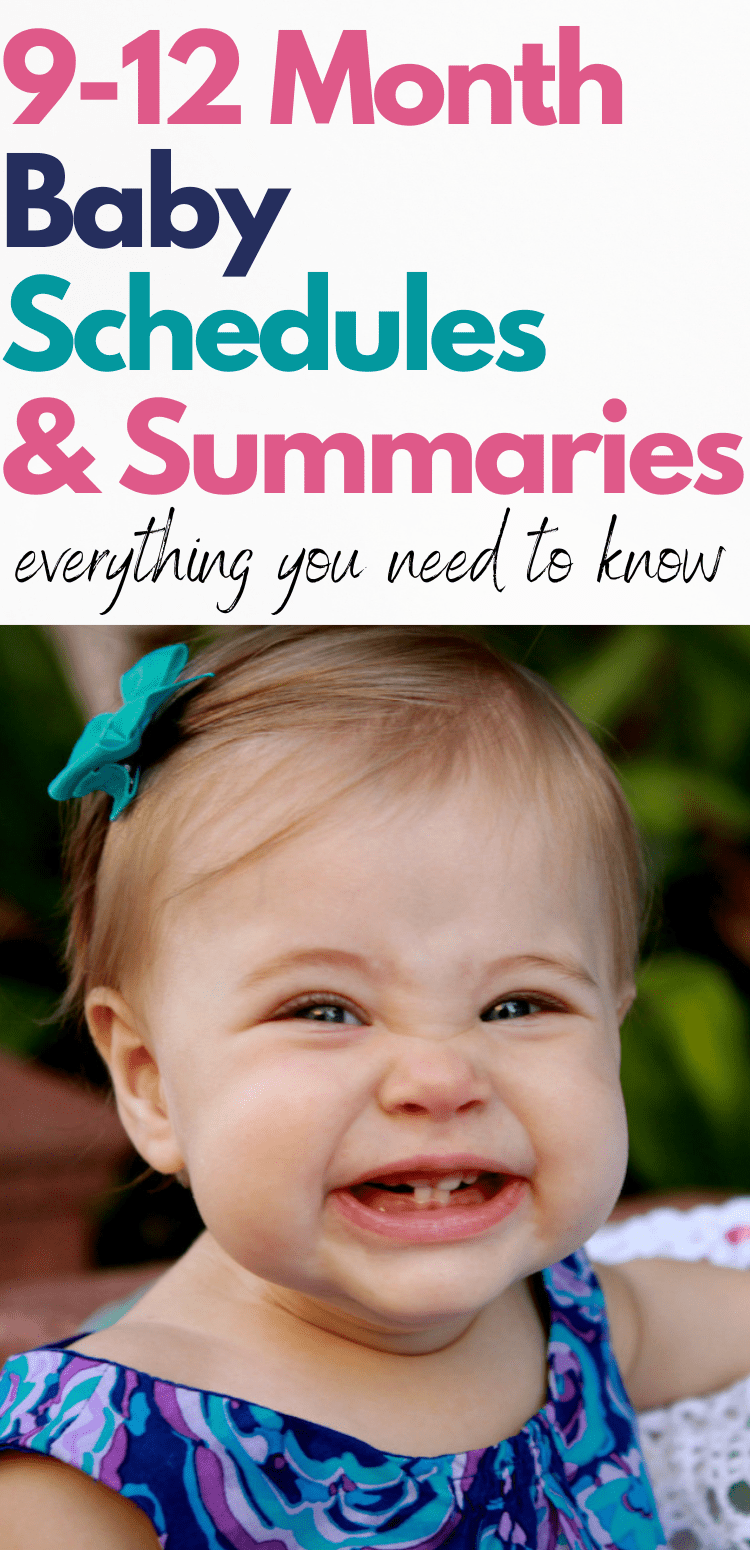
Baby Summaries: Nine Months Old
Nine months old is when many babies start saying their first words… so keep your eyes and ears open for “mama,” “dada,” and anything else baby might have to say! But if they don’t utter the magic words this month, don’t fret. That’s also normal.
Either way, baby is getting ready to talk, which means that she starts understanding more words, too. Just keep talking to them and reading to them to encourage that development! Here are more tips for language development. New skills can often also align with a growth spurt so do not be surprised if night wakings occur on occasion or if awake time needs to be shortened to allow for extra sleep when the leaps create sleep problems or tougher nap transitions.
At nine months it is also common for babies to start crawling. In any case, now is the time to start baby-proofing your house if you haven’t already! And don’t be surprised if, once she’s mobile, she leaves destruction in her wake. This is how she learns about the world around her!
If you haven’t already begun working on blanket time or establishing an independent playtime routine for your baby, this is an excellent age to start. Having baby in a safe place with their favorite toy is a great way to allow yourself to get things done as well as help them have so much fun learning to entertain themselves!
I’d highly recommend using a pack and play for independent playtime but even just starting with baby buckled in the high chair for a few minutes at a time can be a great way to start. It doesn’t need to be for a long time to help see the benefits! Be sure to read this post for some ideas of the best toys to encourage independent play too.
Most babies begin being mobile between 8-10 months old but the good news if even if it takes a little longer to reach this milestone, it’ll eventually happen at their own pace. Developmental leaps occur at different ages and stages and involve many different elements including genetics or even birth order!
Another way nine-month-olds do this is by grabbing everything they can get their hands and throwing it, banging it, or sticking it into their mouths. As long as it’s not dirty or a choking hazard, this is good for their development!
This is also the point when baby will likely start imitating you! New parents will be in awe as your little one seemingly makes drastic changes to their little personality. It’s exciting in a good way! The first year of your baby is filled with many new things which is a good thing although it also means that you can’t really get too comfortable. Just as soon as you work through sleep disturbances and establish baby’s sleep schedule their brain development hits a leap and they experience physical development that causes that regular schedule to be thrown out of whack for a bit!

9 Month Old Sleep Schedules
Here is an example of what a daily schedule might like look for a nine month old baby. Obviously, feel free to use this as a template but adjust it for your family’s needs and lifestyle! It’s just to give you an idea. At this age, none of my babies were having a 3rd nap and all of them were getting around 12 hours of sleep each night. Daytime naps were around 2 hours in length, but during times when they didn’t seem to get enough sleep, I’d often allow that afternoon nap to go for 3-4 hours if needed.
- 6:45-7:15: Get up then nurse
- Solids
- 9:00-11:00: Morning Nap
- 10:45-11:15: Get up then nurse
- 12:00ish: Solids
- 1:00-3:00: Afternoon Nap
- 2:45-3:15: Get up then nurse
- 6:00: Solids for dinner with family
- 6:40: Bath
- 7:00: Nurse then straight to bed
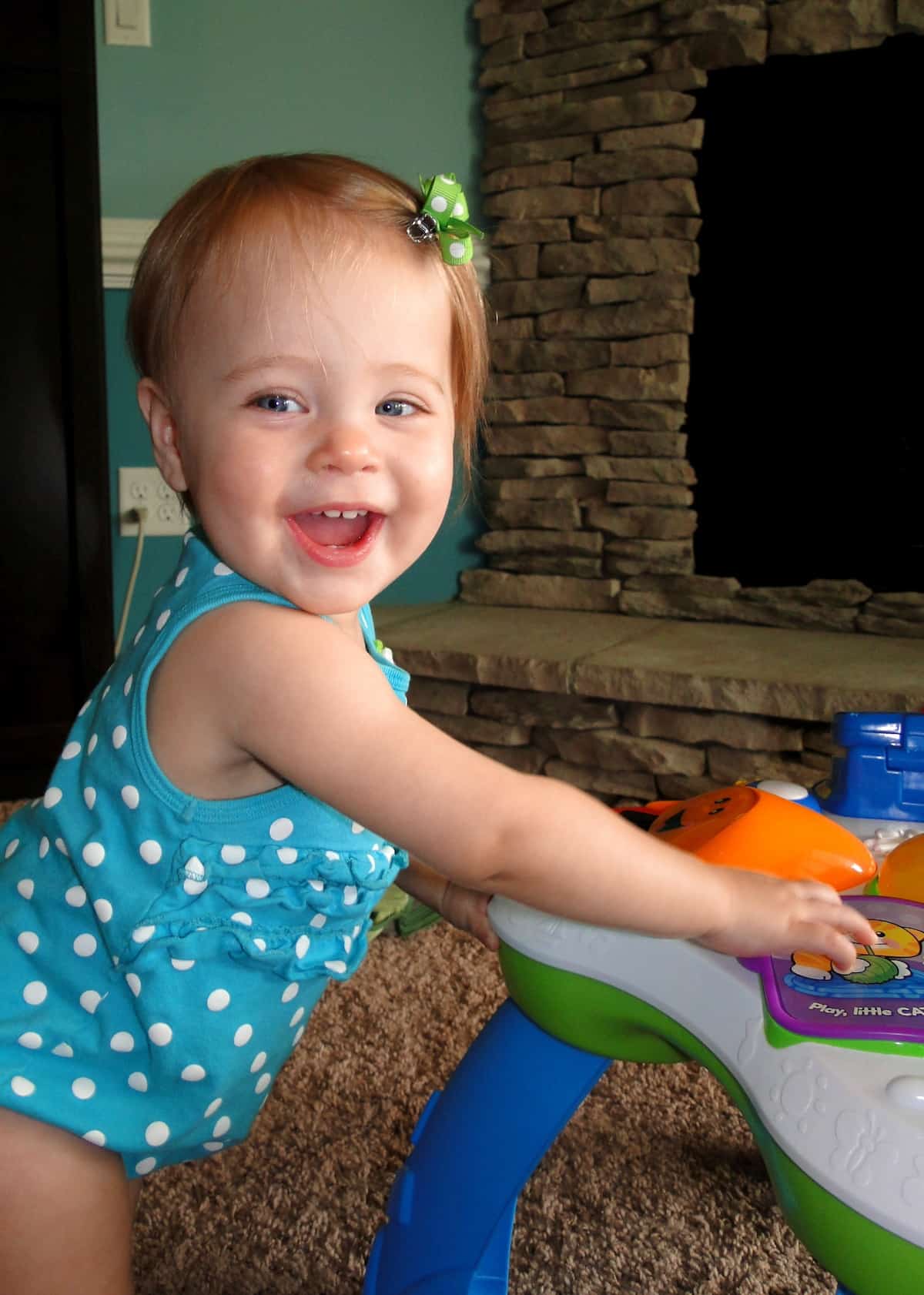
9 Month Old Baby Summaries: 4 Different Examples
Here is a summary of the major milestones and developments I documented for each of my four kids during their tenth month of life. (which is nine months old – I know, it gets confusing!) Four kids means four very different babies, so hopefully, this shows you that while there are similarities, every child is unique! Some babies are a naturally great sleeper and others need a lot of sleepless nights before finally getting that solid night sleep!

Big Developmental Milestones During Month 9
- Possibly their first words!
- Crawling, pulling up to standing and/or moving by holding onto furniture
- Can gesture to things they want
- Clapping or waving
- Imitating Mommy and Daddy
- Attachment to a comfort object
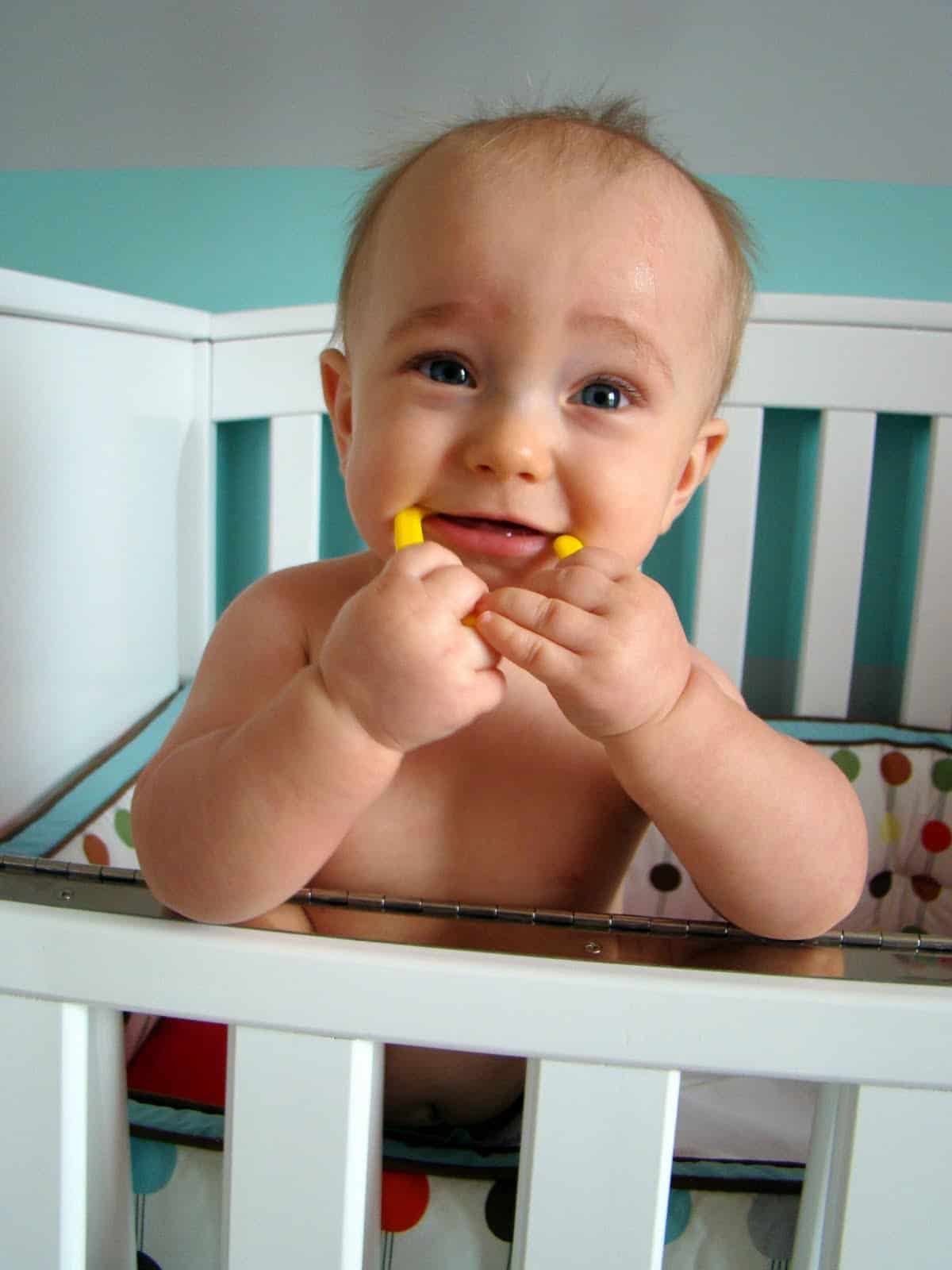
Baby Summaries: Ten Months Old
By now, most babies are on the move and ready to explore… and get into anything they can! They’ll also try to escape the playpen or even the crib. So be sure to keep an eye on him as much as possible! Baby-proof the house if you haven’t yet and start gating off stairs and other off-limits areas.
Now is also the time to start introducing baby to the sippy cup. It’s recommended that they be weaned completely by their first birthday or shortly after, both because it gets more difficult the older they are and because it protects their teeth and overall health! (Source: Cleveland Clinic). I LOVE this sippy cup as a first cup for baby and used it for all four of mine 🙂
I usually introduce a sippy cup with water at around 6 months old but start to introduce cow’s milk in the sippy cup around 10 months old. This helps easy into cow’s milk and makes for a smoother transition when weaning from breastfeeding or the bottle.
Changes in baby’s behavior or habit patterns are common around this time: because they’re so interested in exploring, they may be less interested in eating. This is totally normal!
Ten month olds also start gaining a firmer grasp of their independence and might get picky with food or finicky to changes in routine. They also might start preferring certain books or videos and wanting to read or watch them over and over again. This is good for their developing brains!
Another thing that 10 month olds commonly start to grasp at this point? Object permanence! If you hide a toy under a blanket or behind your back, they’ll recognize that it still exists even though it’s out of sight and try to find it. They may also respond will to games like peek-a-boo and hide-and-seek!
A baby sleep regression 10 months old? It’s possible! A 4-month sleep regreens is very common but some babies will experience a 10-month sleep regression as well. I have this post about how I handled the 4 month sleep regression with tips on how to get those sleep issues handled and your baby back to being a good sleeper!
Teething pain may also cause issues for your baby at this age. A baby going to get a new tooth can be a baby going through a lot of pain and tears! Be sure to read my teething tips here for how to soothe a teething baby at night and during the day.

10 Month Old Sleep Schedules
Here is what a basic day-to-day schedule might look like for a ten month old baby:
- 7:00 Up for day, nurse, breakfast (whole milk in sippy with meal)
- 9:00 Down for first nap
- 11:00 Up from nap, nurse, lunch (whole milk in sippy with meal)
- 1:00 Down for second nap
- 3:00 Up from nap, sippy of whole milk with some cheese/cheerios as snack
- 6:00 Dinner with family (whole milk sippy with meal)
- 6:30 Bath
- 6:45ish Nurse then straight to bed for night sleep
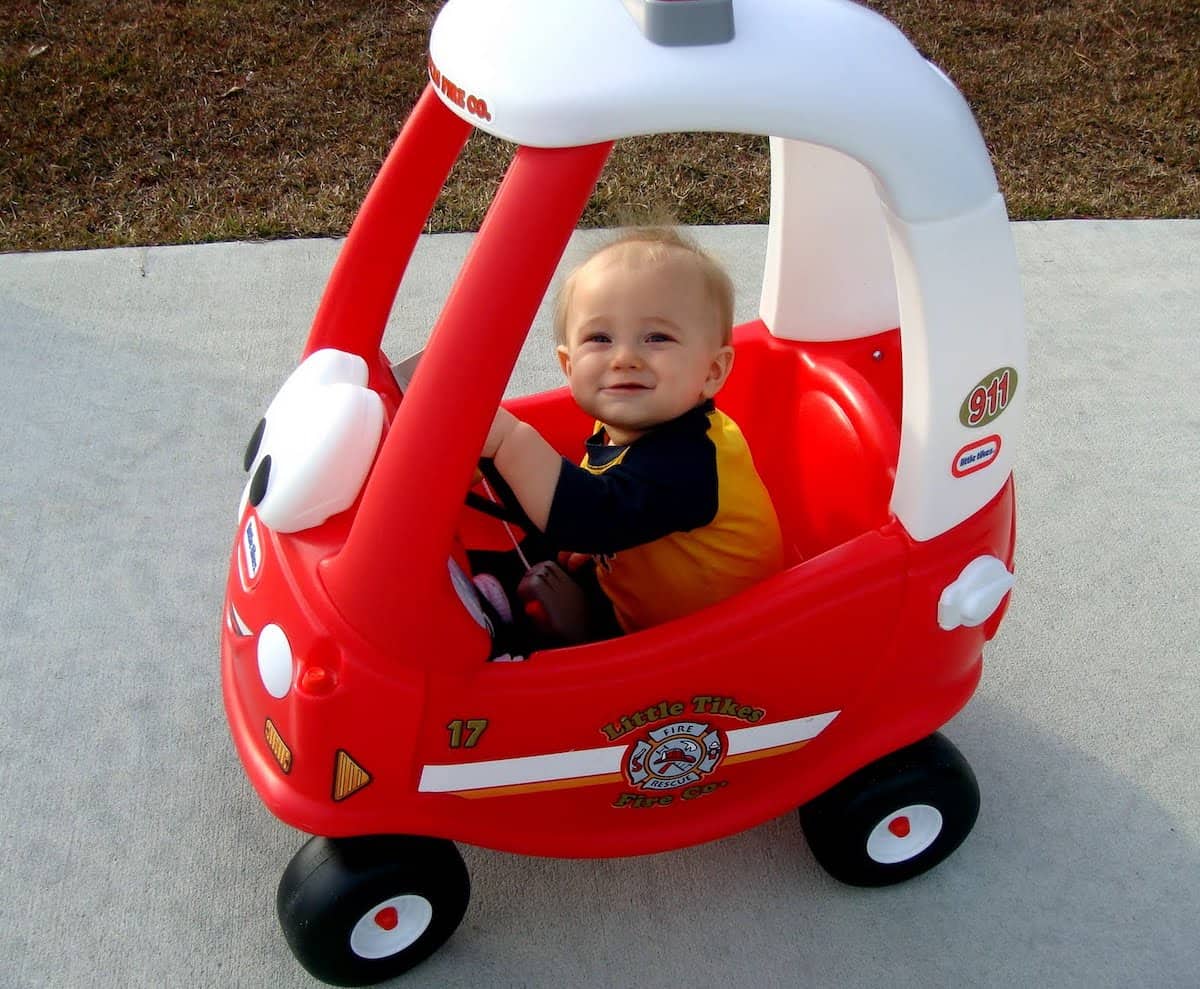
10 Month Old Baby Summaries: 4 Different Examples
At 10 months old, each of my four kids shared some similarities but also had their own unique patterns of development, and so will your baby! These are just to help give you a grasp of what you might expect!
- Kye’s 10 Month Old Summary
- Britt’s 10 Month Old Summary
- Tess’s 10 Month Old Summary
- Spear’s 10 Month Old Summary

Big Development Milestones During Month 10
- Crawling, pulling to standing, moving around with furniture
- First words, if they haven’t yet!
- Introduction to the sippy cup
- Sense of independence, start expressing preferences or distastes
- Object permanence
- Separation anxiety

Baby Summaries: Eleven Months Old
Just one short month away from their first birthday! How did this happen already? As you approach the one year mark, you will no doubt notice major signs of development as they prepare to enter the toddler phase. (And yes, at one year old they are considered pre-toddlers or even toddlers! Crazy, right?)
Now is the time to start exploring birthday party ideas for that first birthday celebration too. Don’t let the planning process stress you out, here are my party planning tips. 🙂 It can also be
Eleven month olds really start to develop their own, unique personalities and they definitely start forming preferences and expressing their newfound sense of independence.
While baby may not be walking yet (some do, but most babies don’t start walking until after their first birthday!) they will be moving around and getting into things, so keep a sharp eye! You’re probably already well aware of this fact and have baby-proofed accordingly.
Do not put pressure on yourself or your baby when it comes to those first steps. NONE of my kids took their first steps until closer to 18 months old. And that’s okay! Again, every baby is unique and physical development comes at its own pace and does not mean there are any concerns at play with motor skills or any sort of reflection of intellect or your parenting.
Since most babies can pull themselves upright into a standing position to prepare for walking, now is a good time to encourage the use of push toys and rolling activity centers, which help them practice!
This is also a time when many babies say their first words if they haven’t already! They can also copy the sounds you make, imitate your movements, clap, wave, make gestures to signify what they want, and use their pincer grasp to pick up small objects!
While baby is getting older and hitting some fun milestones, like language skills, sometimes those little people also begin to experience big feelings and don’t have the verbal skills to best communicate feelings or an unmet need. Their emotional brain is often developing faster than their communication skills can keep up and this can often lead to negative behavior, disruptions to daily life, and even embarrassing moments for mom in a public place or new situations for baby.
This is a normal part of child development but may create sleep regressions as well as dreaded 11 month old tantrums. Temper tantrums are usually associated with older children but toddler tantrums, even a young toddler, are also possible. Instead of entering into power struggles with your pre-toddler, stick to your bedtime routine, and possibly set an earlier bedtime. More sleep is never a bad idea and usually, the crib is a safe space for those strong emotions to play themselves out and avoid dangerous situations where the toddler’s tantrums could cause injury.
If your little one is experiencing tantrums it can have a significant impact on your own mental health and your ability to o complete daily activities or pour into older siblings in this difficult period. It is okay to take a break. Leave baby with Dad for a little bit when you go to the grocery store. Spend one on one time with your older babies. Reach out to other family members and allow them to pour into your little one for a bit. Sometimes grandma’s house can be a safe place and a great time away from daily routine to help older babies get a break too! Grandparents can have a significant impact on small children and by even just making a funny face or singing nursery rhymes can take your toddler from back arching and fit pitching to smiling, laughing and making good choices!

11 Month Old Sleep Schedules
Here is the basic outline of a typical 11 month old’s eating and sleeping schedule. Feel free to use or modify to fit your needs!
- 9:00-11:00 nap
- 11:00 your baby can read movie while I make lunch
- 11:30ish: lunch with whole milk to drink
- 1:00-3:00 nap
- 3:00 small snack (usually dairy) with whole milk to drink
- 5:30 dinner with family (whole milk to drink)
- 6:15 bath
- 6:45 nurse
- When done nursing: straight to bed for baby’s bedtime
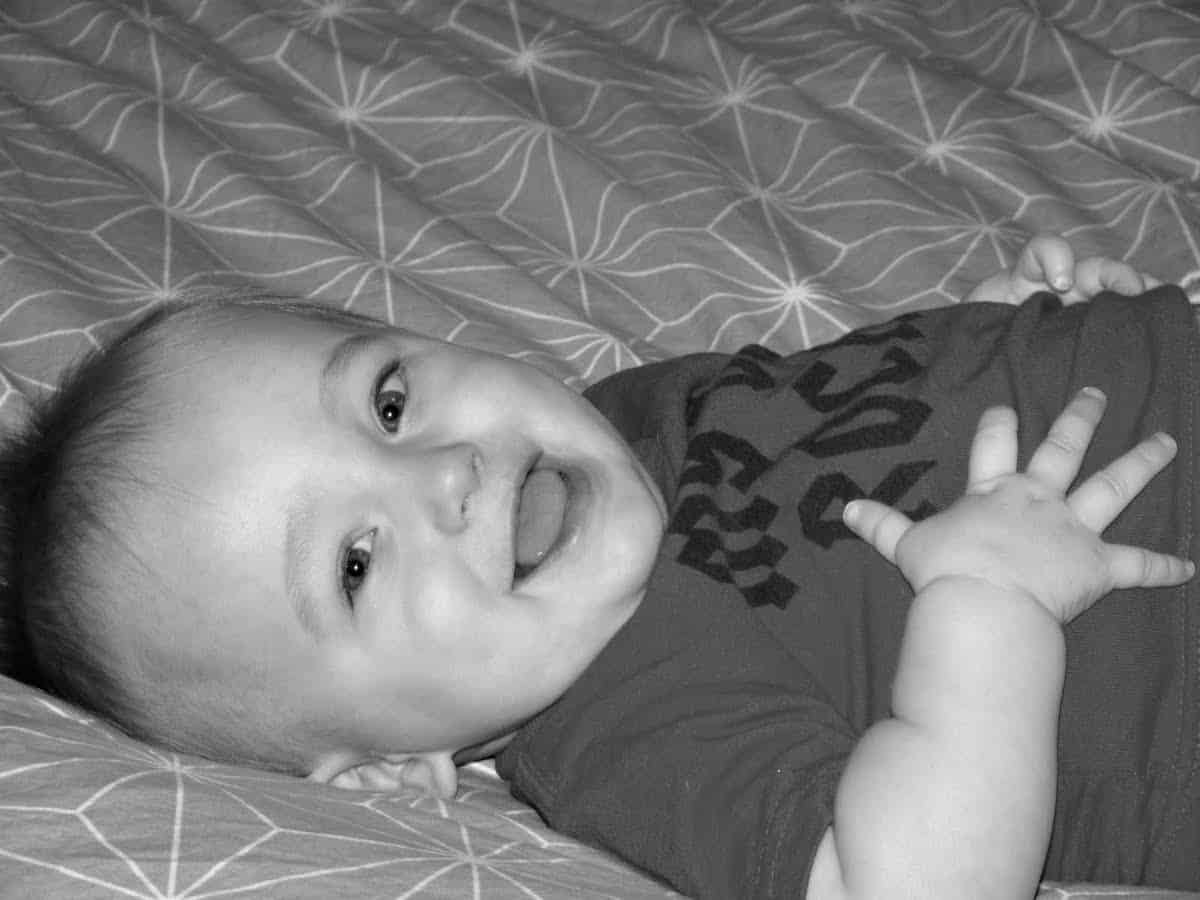
11 Month Old Baby Summaries: 4 Different Examples
The following summaries for each of my four kids will give you a foundational grasp of what you might expect when your baby is 11 months old, bearing in mind that each child is unique! Many of the developments at this stage vary wildly from baby to baby!
- Kye’s 11 Month Old Summary
- Britt’s 11 Month Old Summary
- Tess’s 11 Month Old Summary
- Spear’s 11 Month Old Summary

Big Development Milestones During Month 11
- First steps, possibly
- First words, if they haven’t yet!
- Clapping and/or waving
- Holds out arms to be picked up
- Pincer grasp
- Imitates Mommy and Daddy

Other Posts To Check Out
- Newborn Summaries and Sleep Schedules: 0-3 Months
- Infant Summaries and Sleep Schedules: 3-6 Months
- Babywise Schedules: Birth to Six Month Baby Summaries
- Babywise Schedules: Birth to 12 Months
- 12 Months of Baby Summaries
- A Simple Guide to Baby-Led Weaning
- 30 First Foods With Baby-Led Weaning
- 10th Birthday Message For My Daughter Love Mom {Tess’s 10th Birthday Letter} - June 12, 2025
- Tips to Maintain Structure While Traveling with Kids - May 22, 2025
- A Letter to my Son on His 16th Birthday From Mom (Kye’s Bday Letter) - April 30, 2025






